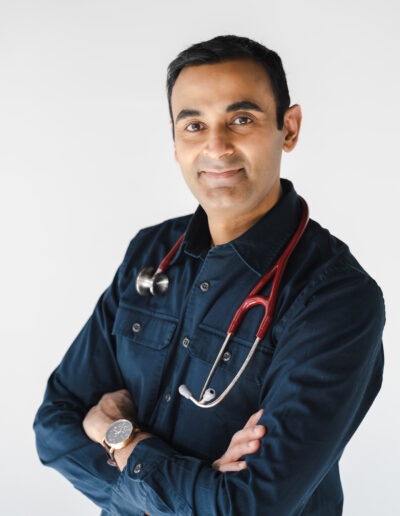
There are so many simple and effective methods of communication in life, that are available to anybody who wants to utilize them. This holds true in both our personal and professional life—if only we know how to tap into them and make them part of our everyday regular communication repertoire. We are defined by our relationships, and how we interact with those around us forms the core of who we are and how the rest of the world perceives us. On this theme, one of my main passions in healthcare is how doctors communicate with patients. I believe everyone in medicine—no matter how experienced we are—needs to be constantly thinking about this and have a self awareness of our own flaws. We are excellent at ensuring doctors reach the correct technical standards before unleashing them on the general public, but not so much with their communication skills (ironic, considering that most of being an effective doctor is essentially being an effective communicator).
I have written extensively about verbal and non-verbal communication techniques that all of us who work in healthcare can use. I would like you all to try another simple and effective question, that only a tiny minority of doctors have probably ever used. After you have seen the patient, talked over any new problem, and examined them—ask them:
“What do you think’s wrong with you?”
Say this in a sincere and affable manner (if you want to be really endearing and can pull it off, even have a cheeky smile on your face). I can say with confidence that over 90 percent of the time, your patient will give you the right answer. They will say something like: “Doc, I think I have an infection”, “Doc, I think it’s my heart failure playing up”, or “Doc, I think it’s broken”. Obviously in certain cases or more rare diagnoses, this doesn’t work. But it does in most.
There are a few reasons why doctors should do this:
(i) It shows that you as a physician respect your patient. It also fosters a human connection. Many patients will be floored that you ask them this, but most will really like it.
(ii) It is humbling for physicians to do this. We may live in an age of sophisticated tests and advanced imaging, but never forget that nobody knows their body better than your patient. They will often tell you the diagnosis themselves. Don’t underestimate how smart people are. It’s their body, and in today’s day and age, they have already probably done their research (I will never understand doctors who berate their patients for searching on google). Gosh, it’s their life we are talking about.
(iii) It can actually lead you to the diagnosis quicker than you may have otherwise. Doctors may not admit this, but we’ve all experienced occasions when an unusual diagnosis rolls straight off a patient’s lips—and turns out to be correct.
I think as a whole, the medical community underestimates the intelligence of our patients. Some physicians truly have their heads up their own a## (and it’s probably not any who may read this blog, since those who are curious enough to read online blogs, are unlikely to be that way!).
Of course, as with anything, this doesn’t mean that it’s always appropriate or necessary to ask the above question. Common sense judgment has to always come into it. But it can take all of 10 seconds, and is a really effective thing to do.
Research suggests that it takes about 66 days for any new habit to become like second nature to you. I encourage healthcare professionals to make it a habit of asking, “So what do you think’s wrong with you?”, as part of their regular communication with patients.

Suneel Dhand is a physician, author and speaker. He is Co-Founder at DocsDox.
Follow me on:
YouTube: Suneel Dhand
Instagram: suneeldhand
Twitter: @SuneelDhand
Facebook: Dr Suneel Dhand

Thank you for being relentlessly compassionate!
Thanks Pam! Appreciate you reading : ) Suneel
As a patient with a chronic illness, this is one of the most important questions any doctor can ask me. After 29 years of often dealing with repeating issues that my current doctor may never have seen, I have valuable information about what is happening and what has worked.
Unfortunately, the follow through on this (in my almost three decades of experience) is the problem. I have myalgic encephalomyelitis (ME). The information in “mains stream” medicine about this disease varies from helpful to harmful.
Clinical experts with a combined over 500 years of experience wrote a primer for physicians. Unfortunately, very few know this exists or have basic understanding about ME. So if I answer “I’m in an ME crash” most doctors will have no concept that I mean my cognition, immune and cardiac systems are impaired and I need support to get out of the crash or to watch for cardiac issues or opportunistic infections.
Your statement about communication is the key. As long as we are using words that have different meanings to the patient than it does to the doctor (crash, post exertion malaise, exertion intolerance), communication issues will continue.
There are estimated to be 1 million in the US who have ME. As a support group leader, I see daily how communication between patients and doctors fail. I can assure you that for this patient community answering the question “What do you think’s wrong with you?” will lead to even more miscommunication UNLESS a doctor has read the primer on ME. https://d3n8a8pro7vhmx.cloudfront.net/meadvocacy/pages/2292/attachments/original/1554817421/Myalgic_Encephalomyelitis_International_Consensus_Primer_2012.pdf?1554817421
Thanks Colleen for your comment. You are right that communication is key. Without it, healthcare is lost. Suneel